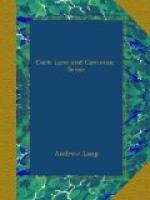Honore Mirabel was a labouring lad, under age, near Marseilles. His story was that, in May (year not given), about eleven at night, he was lying under an almond tree, near the farm of a lady named Gay. In the moonlight he saw a man at an upper window of a building distant five or six paces, the house belonged to a Madame Placasse. Mirabel asked the person what he was doing there; got no answer, entered, and could see nobody. Rather alarmed he went to a well, drew some water, drank, and then heard a weak voice, bidding him dig there for treasure, and asking that masses might be said for the soul of the informant. A stone then fell on a certain spot; stone-throwing is a favourite exercise with ghosts everywhere.
With another labourer, one Bernard, Mirabel dug, found a packet of dirty linen, and, fearing that it might hold the infection of plague, dipped it in wine, for lack of vinegar. The parcel contained more than a thousand Portuguese gold coins. Bernard and his mistress were present at the opening of the parcel, but Mirabel managed to conceal from them the place where he hid it, not a very likely story. He was grateful enough to pay for the desired masses, and he had himself bled four times to relieve his agitation. Mirabel now consulted a merchant in Marseilles, one Auguier, who advised him to keep his old coins a mystery, as to put them into circulation would lead to inquiry and inconvenience. He lent Mirabel some ready money, and, finally, induced Mirabel to entrust the Portuguese hoard to his care. The money was in two bags, one fastened with gold-coloured ribbon, the other with linen thread. Auguier gave a receipt, and now we get a date, Marseilles, September 27, 1726. Later Auguier (it seems) tried to murder Mirabel, and refused to return the deposit. Mirabel went to law with him: Auguier admitted that Mirabel had spoken to him about having found a treasure which he would entrust to Auguier, but denied the rest. In his house was found a ribbon of a golden hue, such as Mirabel used to tie up his bag, and a little basket which has no obvious connection with the matter. The case was allowed to come on, there were sixteen witnesses. A woman named Caillot swore to Mirabel’s having told her about the ghost: she saw the treasure excavated, saw the bags, and recognised the ribbon. A man had seen Mirabel on his way to give Auguier his bags, and, indeed, saw him do so, and receive a piece of paper. He also found, next day, a gold coin on the scene of the interview. A third witness, a woman, was shown the treasure by Mirabel.
The narrator here makes the important reflection that Providence could not allow a ghost to appear merely to enrich a foolish peasant. But, granting ghosts (as the narrator does), we can only say that, in ordinary life, Providence permits a number of undesirable events to occur. Why should the behaviour of ghosts be an exception?
Other witnesses swore to corroborating circumstances. Auguier denied everything, experts admitted that the receipt was like his writing, but declared it to be forged; the ribbon was explained as part of his little daughter’s dress. The judge decided—no one will guess what—that Auguier should be put to the torture!




